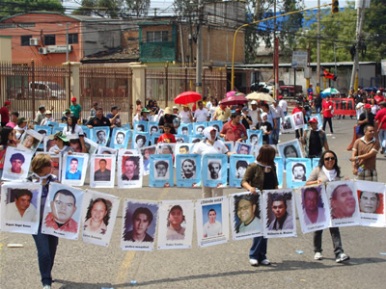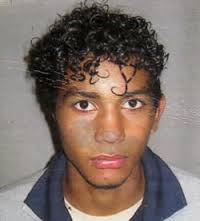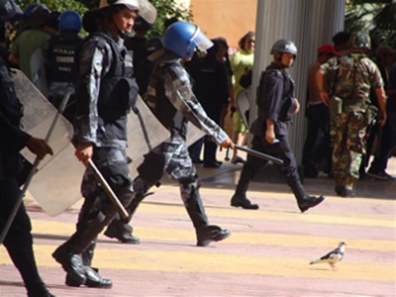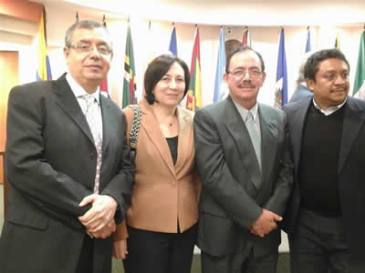This is how the pronouncement from the human rights organizations FIDH (International Federation for Human Rights), CIPRODEH and COFADEH begins; the statement was released following the announcement by the Prosecutor of the International Criminal Court stating that the Court would not continue its preliminary examination regarding Honduras.
According to the statement, FIDH and its member organizations in Honduras, COFADEH and CIPRODEH, deeply regret the announcement today that the International Criminal Court (ICC) Office of the Prosecutor (OTP) will no longer examine allegations of crimes against humanity committed in Honduras after the military coup in 2009 and in Bajo Aguan. Victims of these crimes currently have little to no recourse at a national level, and must not be left without access to justice and redress. i
Context:
The 2009 Coup d’état in Honduras resulted in systematic and brutal repression against social movements protesting against the coup and many violations of human rights such as illegal detentions, torture and extrajudicial executions.
In response to the serious nature of human rights violations that were happening at this time, the high level of impunity as well as a lack of governability in the country post-coup, human rights organizations did everything possible to denounce what was happening. In June 2010, the principal human rights organizations pushed for the creation of the “Commission of Truth” (as an alternative to the Commission of Truth and Reconciliation (CVR), created by Porfirio Lobo’s government) with the objective of “clarifying the actions carried out during the June 28, 2009 coup d’état, to demand justice for the population of Honduras which had been affected by the coup and to insist on the adoption of necessary measures to prevent a reoccurrence of these types of events in the future.” The first recommendation in the Report of the Commission of Truth, “The most authorized voice is the voice of the victims,” is to “investigate and prosecute the intellectual and material actors responsible for the Coup and the human rights violations which were a direct result of it.” ii
Parallel to the complaints filed with the national justice system, international actions were also initiated, including before the Interamerican System for Human Rights and the International Criminal Court.
After five years of investigation, the Prosecutor for the ICC, Fatou Bensouda declared that “I have come to the conclusion that the violations perpetrated between June 28, 2009 and January 27, 2010 don’t constitute crimes against humanity under the definition of the Statute, and therefore they don’t constitute crimes that the ICC has the faculty to investigate”. However, we recognize that “human rights violations were committed on June 28, 2009 and subsequent to this date and that these violations can be directly attributed to the authorities of the regime which took power during the coup.” iii
The FIDH and its member organizations point out that “Accountability for grave crimes is not only necessary for victims and their family members, but for the wider Honduran community to restore its faith in its own government’s ability to serve and protect its citizens.” iv
For this reason, it is pertinent to ask:
More than six years after the Coup d’état, how has the Honduran judicial system acted to sanction those responsible for committing human rights violations? We can examine how some of the emblematic cases of human rights violations related to repression of protestors highlighted in the Truth Commission Report have been addressed. Has there been justice in these cases?
Isy Obed Murillo, first fatality of the repression.
On July 5, 2009, Isy Obed Murillo became the first fatality of the coup d’état. On this day thousands of Hondurans had come together in the Toncontin Airport to await the return of the Honduran President, Manuel Zelaya, which had been announced for this day. Soldiers shot fired on the crowd with live ammunition, nineteen year old Isy Obed received a bullet to the head, killing him instantly.
The Human Rights Prosecutor opened a file on the case, but to this day the case continues in the investigation stage. The Center for Constitutional Rights (based in New York), with the assistance of COFADEH, presented a case to the Federal Southern District Court of Texas in the name of David Murillo and Silvia Mencias, parents of Isy Obed, against Roberto Micheletti, President of the Honduran Congress who became President subsequent to the coup, who allegedly owned property in Texas and for that reason a case could be brought against him there. The case denounces “extrajudicial executions, assassinations, persecutions and other serious human rights violations which occurred in Honduras under the authority and direction of Micheletti.” In April 2013 the U.S. Court dismissed the case. v
Like the demonstration of July 5th, many protest marches were brutally repressed from the day of the coup until the end of 2011, including:
Repression on August 12, 2009, Tegucigalpa
On August 12, 2009 a march in Tegucigalpa against the coup d’état was brutally repressed. Twenty seven people were arrested, including people who had not participated in the march. Those arrested were victims of cruel treatment and they were later taken to an irregular detention center, the battalion of the military’s anti-riot “COBRAS unit”. Elder Madrid Guerra, who was in charge of the COBRAS unit, according to COFADEH “could have controlled the aggression against those arrested, rather, he hid information regarding this group that was illegally taken to this military unit.” These people were detained for several days. Later, they were released, under the condition that they report regularly to a police station. They were initially accused of sedition, illegal protest property damage. The case against them was dismissed in June 2010. vi
COFADEH then brought charges against the police official in charge of the operation, Elder Madrid Guerra and the Prosecutor for Human Rights began a legal process against him and five additional police officials, accusing them of torture, illegal detention, abuse of authority and harassment. At the end of February 2015 the judge found the (then) national police commissioner Elder Madrid Guerra innocent of the charges. This decision is still under appeal. For the other officials, the court applied an Amnesty Decree issued in 2010. vii This decision was rejected by the prosecution and a ruling from the Constitutional branch of the Supreme Court is pending.
It is important to note that despite of this ongoing legal process, Madrid Guerra was rewarded and promoted to a superior rank in June 2014. In May 2015 he was named head of the National Police. viii
Repression in Choloma, August 14, 2009
In the case of police repression in Choloma, just two days after the repression in Tegucigalpa, two hundred police carried out the violent eviction of a demonstration. They destroyed the cameras and other equipment of three social communicators who were covering the demonstration. Police threw tear gas into houses and carried out illegal searches. They pursued demonstrators, cornering them in different parts of Choloma where they were subject to cruel inhumane and degrading treatment. Thirty two people were arrested and eight were injured. One woman denounced that she had been raped by several police. This was one of the most brutal examples of repression that has been documented during the post coup period. ix
The Human Rights Prosecutor initiated a case against Hector Ivan Mejia and Abrahan Figueroa Tercero, both high officials in the National Preventative Police unit. They were charged with illegal detention, torture and abuse of authority. Attorney, Omar Menjivar initiated charges regarding actions against a journalist from Radio Progreso, Gustavo Cardoza, who was beaten and illegally detained while exercising his right as a journalist to cover the demonstration. The police were found innocent of all of the charges which had been brought against them. This decision remains on appeal to the Constitutional Branch of the Supreme Court.
Repression September 15, 2010 San Pedro Sula
One year after these events in Choloma, in the same department, the people of San Pedro Sula suffered the first heavy repression under the new government of President Lobo.
On September 15th, 2010 Central America Independence day is celebrated, the National Resistance Front organized a demonstration that was to conclude with a musical concert. When the concert was just beginning with music from the band Cafe Guanacasco, the police and the military bombed the concert with tear gas and a toxic liquid that was sprayed from tanks, attacking and brutally beating the demonstrators. Several people were wounded and intoxicated by the gases including street merchant Efrain Lopez, who died from the toxic gasses. Many people were injured, including five people who were hospitalized. Thirty seven people were arrested. The police destroyed most of the equipment of the musical group. At the same time, the installations of Radio Uno were attacked by the police, who broke the windows of the building where the radio is housed and launched tear gas canisters inside. x
The Prosecutor for Human Rights and private prosecutor, attorney Victor Fernandez, representing the victims, initiated a legal process against the sub commissioners of the National Police, Hector Ivan Mejia (also accused in the case of the repression in Choloma) and Daniel Omar Matamoros. They were both accused of the crimes of violation of the duties of functionaries, illegal detention, torture and injury. Nevertheless, the Appellate Court dismissed all of the charges which had been brought against them.
In addition to these cases, hundreds of other cases which occurred in the aftermath of the coup d’état have not resulted in charges being filed, or even investigated by the Prosecutor’s Office. Even in the emblematic, cases which are highlighted in this article, no victim of post-coup repression has obtained justice. With the exception of one case, no one has been convicted for human rights violations during this period. xi And several high ranking officers from the Police and Armed Forces have received promotions. For example, Hector Ivan Mejia and Elder Madrid Guerra, the two Commissioners involved in the three cases of repression presented here, far from being sanctioned, they have been promoted in rank, and today both are part of the high command of the Police.
Following the decision of the International Criminal Court (ICC) the three organizations (FIDH, CIPRODEH and COFADEH) reiterate the need for a “hybrid mechanism, like an International Commission against Impunity and Corruption in Honduras (CICIH), composed of national and international experts for the effective investigation and prosecution of serious crimes.”
Additionally, several cases have been taken to the Interamerican System of Human Rights. On November 10, 2015 the Interamerican Court, announced its ruling in favor of four judges, member of the “Association of Judges for Democracy”, who were removed after publishing communications denouncing the coup d’état. This ruling against the State of Honduras obligates the State to reinstate the judges or, that not being possible, provide compensation to the judges equal to what they would have received had they remained in their positions . This sentence, condemning the State represents a light of hope for the victims, not only in this case, but also for all victims of the Coup d’état who continue to demand justice.
NOTES:
i https://www.fidh.org/en/issues/international-justice/international-criminal-court-icc/honduras-crimes-committed-following-the-2009-military-coup-must-be The ICC only holds jurisdiction over genocide, crimes against humanity and war crimes, and the Prosecutor concluded that, based on the information available to her, the legal criteria for those crimes had not been met.
ii For more information, see our article: https://hondurasaccompanimentproject.wordpress.com/2012/10/
iii Declaration of the International Criminal Court Prosecutor, October 28, 2015: https://www.icc-cpi.int/en_menus/icc/press%20and%20media/press%20releases/Pages/es_otp-stat-28-10-2015.aspx
iv Additionally, the petitioning organizations announced that they will challenge this decision: http://www.defensoresenlinea.com/cms/index.php?option=com_content&view=article&id=3782:organizaciones-de-derechos-humanos-de-honduras-impugnaran-resolucion-de-la-fiscalia-de-la-cpi&catid=37:mem-y-imp&Itemid=150
vi Truth Commission report: pg. 141
vii http://defensoresenlinea.com/cms/index.php?option=com_content&view=article&id=3489:nuevo-cargo-a-policia-que-ha-sido-acusado-por-violar-ddhh-en-honduras&catid=37:mem-y-imp&Itemid=150
viii http://defensoresenlinea.com/cms/index.php?option=com_content&view=article&id=3489:nuevo-cargo-a-policia-que-ha-sido-acusado-por-violar-ddhh-en-honduras&catid=37:mem-y-imp&Itemid=150
ix Truth Commission report: pgs. 141-145
x Truth Commission report: pgs. 153-154
xi The only case in which there has been a verdict and sentence against a police officer is from February 2012. A woman from the Preventative Police was sentenced to 8 years in jail (with the sentence commuted) for illegal detention and torture of a female demonstrator in San Pedro Sula in August 2009. See: http://www.voselsoberano.org/index.php?option=com_content&view=article&id=13400%3Acondenan-a-mujer-policia-por-torturas-a-una-mujer-militante-de-la-resistencia&catid=1%3Anoticias-generales&Itemid=8




Leave a comment